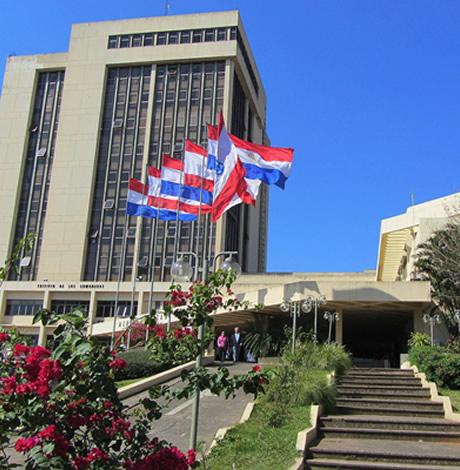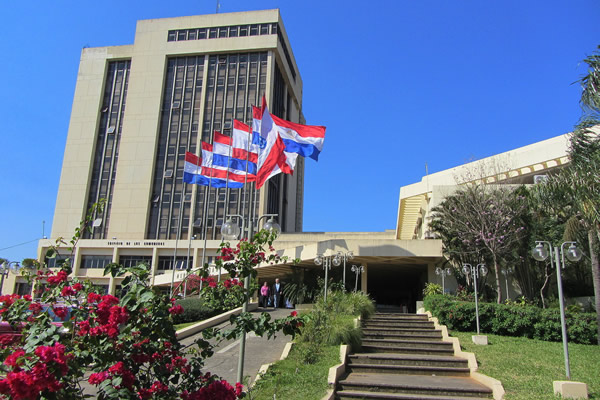News
Paraguayan police clash with LGBT advocates
At least 10 injured during protest ahead of OAS meeting


Paraguayan police on Monday clashed with LGBT rights advocates who protested in the South American country’s capital. (Photo by Felipe Mendez; courtesy Creative Commons)
Officers with the Paraguayan National Police clashed with members of Somosgay and Lesvos — two LGBT advocacy organizations in the landlocked South American country — in Asunción as they protested President Horacio Cartés’ decision to oppose a proposed OAS declaration that would have indicated support of “diverse families.”
A video that Somosgay posted to YouTube shows protesters waiving rainbow flags before police in riot gear approached and struck some of them with batons. The clip also shows two journalists who appear to have been injured during the confrontation.
Sergio López of Somosgay told the Washington Blade during a Skype interview from Asunción on Monday that a pregnant woman was among those injured.
“We suffered repression by the national police,” said López.
The clashes took place as a much larger group of anti-gay protesters gathered outside the hotel where the three-day OAS meeting began on Tuesday under the banner “development through social inclusion.”
A police spokesperson acknowledged to a Paraguayan radio station that clashes took place between the officers who were protecting the anti-gay protesters and the LGBT rights advocates. He said members of Somosgay and Lesvos provoked the officers to respond.
“Some 60 gay people appeared out of nowhere,” said the spokesperson as Hoy, a Paraguayan newspaper, reported. “We spoke with them, they understood, they passed and we again asked them to disperse but they did not want to do so. We insisted a lot, spoke with them a lot, we then sent in a platoon to divide them, but they became aggressive when the blue helmets (riot police) came.”
López described the protest to the Blade as “peaceful.”
Caribe Afirmativo, a Colombian LGBT advocacy group whose members are attending the OAS meeting in the Paraguayan capital, was quick to condemn the police.
“Caribe Afirmativo rejects the attacks by the police who victimized our colleagues with the organization Somosgay of Paraguay a few hours ago,” said the group on its Facebook page. “They were protesting in a peaceful way in front of the venue where we are meeting.”
Esteban Paulón, president of the LGBT Federation of Argentina, told the Blade that a member of his organization is attending the OAS meeting in Asunción. It remains unclear whether she attended the protest.
“We emphatically reject these acts of homophobic violence in Paraguay,” Paulón told the Blade.
LGBT Paraguayans lack basic legal protections found in neighboring Argentina and other South American countries.
López and Somosgay CEO Simón Cazal petitioned a Paraguayan judge to register their Argentina marriage, but she denied their request last year.
Somosgay in 2013 opened Paraguay’s first men’s health clinic in Asunción, but Cazal told the Blade the landlocked South American country has limited resources to combat HIV/AIDS among at-risk groups. Discrimination and violence against trans Paraguayans remains pervasive.
An OAS spokesperson declined to comment on the clashes.
A member of an anti-LGBT group earlier on Tuesday posted a picture to Facebook from a forum that said “groups from the gay and abortion lobby attack and offend while our life and family delegation presents our document.” López told the Blade that he and other advocates had planned to meet with officials to discuss the protest.
The OAS adopted an anti-discrimination resolution that includes sexual orientation and gender identity and expression during its 2013 meeting that took place in Guatemala.
Caribe Afirmativo called upon the OAS to condemn the clashes between police and protesters. The group also urged the Paraguayan government to punish the officers who were involved.
“Unfortunately the Paraguay of President Cartés casts a negative light over a continent that wants to advance towards more equality,” said Paulón. “We clearly support the organizations Somosgay and Lesvos and we commit our resources to built together with them an egalitarian Latin America.”

The Mexican Senate on Thursday approved a bill that would ban so-called conversion therapy in the country.
Yaaj México, a Mexican LGBTQ rights group, on X noted the measure passed by a 77-4 vote margin with 15 abstentions. The Chamber of Deputies, the lower house of Mexico’s congress, approved the bill last month that, among other things, would subject conversion therapy practitioners to between two and six years in prison and fines.
The Senate on its X account described conversion therapy as “practices that have incentivized the violation of human rights of the LGBTTTIQ+ community.”
“The Senate moved (to) sanction therapies that impede or annul a person’s orientation or gender identity,” it said. “There are aggravating factors when the practices are done to minors, older adults and people with disabilities.”
Mexico City and the states of Oaxaca, Quintana Roo, Jalisco and Sonora are among the Mexican jurisdictions that have banned the discredited practice.
The Senate in 2022 passed a conversion therapy ban bill, but the House of Deputies did not approve it. It is not immediately clear whether President Andrés Manuel López Obrador supports the ban.
Canada, Brazil, Belgium, Germany, France, and New Zealand are among the countries that ban conversion therapy. Virginia, California, and D.C. are among the U.S. jurisdictions that prohibit the practice for minors.
The White House
Four states to ignore new Title IX rules protecting transgender students
Biden administration last Friday released final regulations

BY ERIN REED | Last Friday, the Biden administration released its final Title IX rules, which include protections for LGBTQ students by clarifying that Title IX forbids discrimination based on sexual orientation and gender identity.
The rule change could have a significant impact as it would supersede bathroom bans and other discriminatory policies that have become increasingly common in Republican states within the U.S.
As of Thursday morning, however, officials in at least four states — Oklahoma, Louisiana, Florida, and South Carolina — have directed schools to ignore the regulations, potentially setting up a federal showdown that may ultimately end up in a protracted court battle in the lead-up to the 2024 elections.
Louisiana State Superintendent of Education Cade Brumley was the first to respond, decrying the fact that the new Title IX regulations could block teachers and other students from exercising what has been dubbed by some a “right to bully” transgender students by using their old names and pronouns intentionally.
Asserting that Title IX law does not protect trans and queer students, Brumley states that schools “should not alter policies or procedures at this time.” Critically, several courts have ruled that trans and queer students are protected by Title IX, including the 4th U.S. Circuit Court of Appeals in a recent case in West Virginia.
In South Carolina, Schools Supt. Ellen Weaver wrote in a letter that providing protections for trans and LGBTQ students under Title IX “would rescind 50 years of progress and equality of opportunity by putting girls and women at a disadvantage in the educational arena,” apparently leaving trans kids out of her definition of those who deserve progress and equality of opportunity.
She then directed schools to ignore the new directive while waiting for court challenges. While South Carolina does not have a bathroom ban or statewide “Don’t Say Gay or Trans” law, such bills continue to be proposed in the state.
Responding to the South Carolina letter, Chase Glenn of Alliance For Full Acceptance stated, “While Supt. Weaver may not personally support the rights of LGBTQ+ students, she has the responsibility as the top school leader in our state to ensure that all students have equal rights and protections, and a safe place to learn and be themselves. The flagrant disregard shown for the Title IX rule tells me that our superintendent unfortunately does not have the best interests of all students in mind.”
Florida Education Commissioner Manny Diaz also joined in instructing schools not to implement Title IX regulations. In a letter issued to area schools, Diaz stated that the new Title IX regulations were tantamount to “gaslighting the country into believing that biological sex no longer has any meaning.”
Governor Ron DeSantis approved of the letter and stated that Florida “will not comply.” Florida has notably been the site of some of the most viciously anti-queer and anti-trans legislation in recent history, including a “Don’t Say Gay or Trans” law that was used to force a trans female teacher to go by “Mr.”
State Education Supt. Ryan Walters of Oklahoma was the latest to echo similar sentiments. Walters has recently appointed the right-wing media figure Chaya Raichik of Libs of TikTok to an advisory role “to improve school safety,” and notably, Raichik has posed proudly with papers accusing her of instigating bomb threats with her incendiary posts about LGBTQ people in classrooms.
The Title IX policies have been universally applauded by large LGBTQ rights organizations in the U.S. Lambda Legal, a key figure in fighting anti-LGBTQ legislation nationwide, said that the regulations “clearly cover LGBTQ+ students, as well as survivors and pregnant and parenting students across race and gender identity.” The Human Rights Campaign also praised the rule, stating, “rule will be life-changing for so many LGBTQ+ youth and help ensure LGBTQ+ students can receive the same educational experience as their peers: Going to dances, safely using the restroom, and writing stories that tell the truth about their own lives.”
The rule is slated to go into effect Aug. 1, pending any legal challenges.
****************************************************************************

Erin Reed is a transgender woman (she/her pronouns) and researcher who tracks anti-LGBTQ+ legislation around the world and helps people become better advocates for their queer family, friends, colleagues, and community. Reed also is a social media consultant and public speaker.
******************************************************************************************
The preceding article was first published at Erin In The Morning and is republished with permission.
South America
Argentina government dismisses transgender public sector employees
Country’s Trans Labor Quota Law enacted in 2021

Protests have broken out across Argentina in recent weeks after the dismissal of transgender people from their government jobs.
President Javier Milei’s action is in stark contract with the progress seen in 2023, where the government’s hiring of trans people increased by 900 percent within the framework of the Trans Labor Quota Law that had been in place since 2021.
Among those affected is Sofia Diaz, a “survivor” who shared her testimony with the Washington Blade hours after she traveled from Chaco Province to Buenos Aires to protest her dismissal.
Presentes, an LGBTQ news agency, reported the government dismissed more than 85 trans employees in less than two weeks.
Diaz, 49, holds a degree in combined arts. She joined the National Social Security Administration (ANSES) in 2022 under the Trans Labor Inclusion Law. The layoffs began in January and left many people feeling uncertain and anguished. It was her turn a few days ago.
Diaz in an interview recounted how the situation became progressively more complicated, with difficulties in accessing information about her employment status and the eventual confirmation of dismissals through WhatsApp messages. This government action, according to Diaz, violates the law.
“We were on a Friday, I think on March 24, in the office and we have a WhatsApp group of other colleagues from all over Argentina who entered through the trans labor quota and they tell us if we can get our pay stubs on the intranet,” Diaz recalled. “So, I tried to enter, I could not, I talked to two other colleagues and they told me no, they could not, and so we went to another person. He couldn’t either.”
“Some people told us that it could be a system error. Well, we were never calm, let’s say not how this issue of installing fear and the perversion with which they do it ends,” she added. “This sadism of … inflicting pain and speculating with your misfortune and so on … is something that characterizes Javier Milei’s government.”
Diaz recalled a list of those dismissed from the agency began to circulate from the union in the afternoon. A colleague passed it on to her, “and well, unfortunately I was also on that list.”
“At that moment the whole weekend went by with anguish, crying, and talking with other colleagues from other places, not only trans, but everyone, everyone and everyone,” she said. “On Monday when we went to try to enter, we could not enter with the biometric, which is the thumb we had to use every morning to enter.”
Despite the difficult moment through which she is going, the trans activist stressed to the Blade that she will continue protesting and will even sue the government because her dismissal is illegal and “violates the constitution itself.”
The LGBTQ community and its allies have mobilized and organized demonstrations, highlighting the importance of defending the rights won and fighting against discrimination and exclusion. Diaz emphasized the fight is not only for the people affected today, but also for future generations, saying the historical memory of the struggles for inclusion and social justice must be kept alive.
“The Argentine government thus faces a key challenge in human and labor rights, where public pressure and social mobilization can play a determining role in protecting the rights of LGBTQ+ people,” Diaz said.
-

 State Department3 days ago
State Department3 days agoState Department releases annual human rights report
-

 Maryland5 days ago
Maryland5 days agoJoe Vogel campaign holds ‘Big Gay Canvass Kickoff’
-

 Politics4 days ago
Politics4 days agoSmithsonian staff concerned about future of LGBTQ programming amid GOP scrutiny
-

 District of Columbia1 day ago
District of Columbia1 day agoCatching up with the asexuals and aromantics of D.C.












